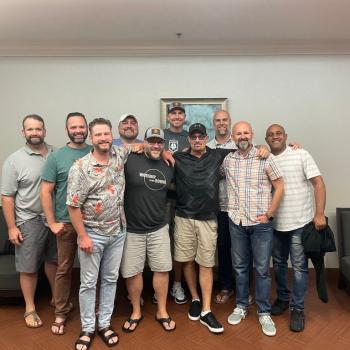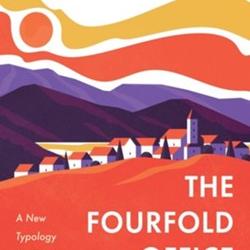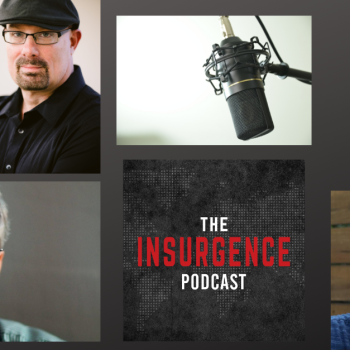Alan Olsan has written a new interesting book for those who are intrigued by history.
It’s called Caspar Schwenckfeld: Between Tyranny and Anarchy.
Imagine a time of religious, spiritual, and social upheaval. People are leaving their traditional churches, finding new ways to evangelize, and choosing less formal ways of doing church, from meeting together in their homes to pooling their resources and living in common under one roof. People with no formal seminary or other religious training are selling everything they own and traveling from place to place sharing the Gospel.
Street preachers are publicly baptizing new believers in nearby rivers and lakes while predicting the end of the world and the return of Christ. Printing presses are pouring out new versions of the Bible and a plethora of Christian books on a myriad of topics. New music is being written to express old truths about Christ and the Gospel.
Sound familiar? For some of us, it sounds a lot like living in the early 1970’s during the Jesus People Movement. My guest author, Al Olsan, who experienced some of those days firsthand agrees but found out it also had surprising similarities to an earlier time in church history; a time he thought he knew well – the early 1500’s and the time of the Reformation.
I asked Alan to describe his book Caspar Schwenckfeld: Between Tyranny and Anarchy, his journey back into the time of the Reformation, and how he found it relevant to our day.

Most of my subscribers will be familiar with names like Martin Luther and John Calvin, but Caspar Schwenckfeld? Who was he?
Answer: Schwenckfeld was a wealthy nobleman from Ossig, Silesia (now part of western Poland) and an early follower of Martin Luther. After Schwenckfeld’s own spiritual awakening, he successfully worked to bring the Reformation to his own homeland. He initially gained the attention and approval of Martin Luther himself before falling out of Luther’s good graces. Within six years of his divine visitation, Caspar began having second thoughts on the direction the reform was taking. Many were misusing Luther’s key doctrine of justification by faith and the freedom from ‘works righteousness’ to promote license and anarchy. In addition, deep and resentful chasms had developed over interpretations of the Lord’s Supper. Schwenckfeld tried to offer fresh light on such controversial topics, but the resulting rejection and verbal abuse that came from Luther, a person whom Schwenckfeld admired and owed so much, was a disheartening blow.
What are the reasons that Schwenckfeld’s story remains so unknown?
Answer: As the saying goes, ‘history is told by the victors.’ Men like Luther and Calvin developed theological systems, established institutions, and organized churches. More significantly, they joined themselves hand-in-glove with the government authorities; the city councils, magistrates, and princes. Schwenckfeld was not a trained theologian and did not desire to begin a church per se. He did not agree with the new Lutheran and Reformed camps using the sword to defend church doctrine. His reaction against the externals of the institutional church made most practices of the church seem secondary, if not totally unnecessary to him, when compared to the primary importance of the inward work of Jesus Christ and his Spirit. In addition, an all-out effort to gather and make available the surviving writings of Schwenckfeld did not happen until the 20th century. Of those writings, a very large percentage remain in the German language.
I sense that you found a bit of a kindred spirit in Caspar Schwenckfeld. How did you stumble upon this relatively unknown reformer?
Answer: I grew up having an idealized and romanticized version of Luther and the Reformation. I was deeply indebted to Luther, his Small Catechism, and all the memorizing of Scripture I did as a child. As I grew older, I became bored with having to ‘punch in’ to church every Sunday morning for a sermon and a liturgy. Something was lacking, but I couldn’t put my finger on it or give expression to it. It was through very unconventional, non-Lutheran ideas (even though many of us were Lutheran) during the Jesus People and Charismatic Renewal in the 1970’s that my own faith was challenged and reawakened.
As the initial excitement of the Jesus Movement and Charismatic Renewal waned, I was looking for encouragement anywhere I could find it that would speak to our own situation, whether in current authors or in church history. We had never quite fit in to the larger, traditional, institutional churches and along with others had survived spiritually in smaller alternative experiments with church life ranging from communal living, living in close neighborhoods of extended households, or meeting in house churches around kitchen tables or living rooms. While reading books about the history of the Radical Reformation; mainly the writings of the Anabaptists and Quakers, I kept bumping into Schwenckfeld’s name in references and footnotes.
His story brought into focus familiar issues and questions we still face today, although in a far less dramatic and life-threatening context than that of the 1500’s. Questions like: What is the Gospel? What is the church and how does it function? Who or what has the final authority to guide and shepherd the church? Should the church ally itself with governments to propagate its message and values? How do we handle persecution especially when it’s done in the name of Christ? How do we respond to division in the church? All these and more issues converged for me in the story of Caspar Schwenckfeld.
Although it can be risky and presumptuous making comparisons to the religious environment of five hundred years ago with our own times, much of what I read resonated with me. The religious turmoil during the Reformation produced individuals and groups who found new ways to answer the call of Jesus Christ and different ways to experience church life together. Whether it was the radical call to carry one’s cross in discipleship, adult believer’s baptism, withdrawal from the world and the creation of a shared community life of the Anabaptists; or the experiential knowing of the living Christ and waiting on the Lord in silence during the gatherings of the Quakers, there was much that I found encouraging. (There were hair-raising, disturbing things said and done as well, which I could also relate to from Jesus People/Charismatic Renewal days).
In the case of Schwenckfeld’s own experiences which were in many respects different from either Anabaptists or Quakers, I saw a predecessor of what myself and many others eventually realized. Caspar’s frustrations with the license he saw in the Reformation, the lack of a clear message of sanctification that brought genuine behavioral change in believers, and the futile, lifeless, and ineffective use of external liturgies, sermons, and sacraments mirrored my own and others’ experiences. Schwenckfeld’s over-riding emphasis and solution to deal with the shortcomings of the Reformation centered around knowing and responding to the risen, glorified, and indwelling person of Jesus Christ individually and collectively.
Schwenckfeld’s story also highlighted what happens when church leaders are tempted to use carnal methods to assume an overbearing control over the lives of their flocks. This, too, was something I could relate to as some of the new churches and attempts at Christian community that sprung up in the Jesus Movement and Charismatic Renewal had problems with authority structures that began to “lord it over others’ faith.” Schwenckfeld’s response to those in spiritual authority who threatened him set a high standard to emulate. While refusing to be intimidated and always ready to defend his positions, he refused to stoop to the same level of name-calling and threatening used by his attackers. He prayed for his enemies, found the good in them when he could, appealed to their consciences, and gloried in the sufferings they caused in his life.
Schwenckfeld’s abandonment to God throughout all his disillusionment, exile, betrayals, slanders, threats, sicknesses, and loneliness was inspiring to me. He managed to know and love Jesus Christ intimately in all the twists and turns of his life and encouraged others to do the same.
Why did you choose the title Caspar Schwenckfeld: Beyond Tyranny and Anarchy?
Answer: We chose that title because it summarized a large part of Schwenckfeld’s desire; finding a middle way between the state supported religious tyranny on the one hand and the anarchy of some of the early followers of the Reformation on the other hand.
I noticed most of the story occurs in the streets of Strasbourg. Why did you choose that setting?
Answer: Schwenckfeld’s voluntary exile from Silesia and move to Strasbourg was a major turning point in his life and a convenient setting from which to tell his story. Strasbourg was buzzing with religious refugees and their activities. Schwenckfeld seemed to cross paths with all the main movers and shakers of the Reformation from southern Germany and Switzerland. It was the beginning of decades of his work going from city to city sharing his vision of reform as he had already done in Silesia. Most of all, it was the city where he would meet Jacob Held, the man who likely became his closest associate for the rest of his life; the person through whom I chose to tell much of the story. As you walk with Jacob and Caspar eavesdropping on their conversations, it’s not just a stroll through the streets of Strasbourg, but a guided tour through unresolved, contentious issues swirling about them set in motion by Luther’s Ninety-Five Theses.
What were your greatest challenges in writing the book?
Answer: Trying to imagine the culture and worldview of five hundred years ago was difficult. Our secular day has its own atrocities that future generations will hopefully look back at in horror and say, “What were they thinking? How could they have been so barbaric?” Looking back at a very externally religious late medieval Europe, it’s hard to wrap your head around torture and capital punishment being used by the church over disagreements over the Lord’s Supper, baptism, finer points of Christology, and the Trinity. Fortunately, there are a remarkable number of available documents, drawings, paintings, broadsides, and maps, as well as architecture that remains standing that can fill in the picture.
One of the most frustrating things to happen during the writing process was to find out after having a large part of the story written, that something did not match the historical chronology, thus making a certain sequence of events or the presence of a person in the storyline to be impossible to have occurred. When I discovered that, I would have to reexamine the storyline and adjust it to match the chronological facts. That could cause days of restructuring and rewriting.
What have you found to be the most rewarding things in having written the book and your hopes for those who read it?
Answer: Writing about Schwenckfeld gave me a sense of connectedness to a story far older and bigger than my own. I no longer felt alone in some of my own observations and questions about the current state of the Evangelical* church. From the beginning of the Reformation, there were alternative viewpoints and attempts at correcting the course it was taking with varying degrees of success and failure. I’m convinced more than ever that that process is still necessary and ongoing.
One hope for those who read the story is that they’ll see the Reformation from a new vantage point. It is too often told with rose-colored glasses. My greater hope is that readers will desire to know and experience Jesus Christ more deeply in Spirit and truth beyond religious obligation and performance. My hope is, that like Caspar, they will find Jesus in whatever hardships come their way, including those that come directly from within the church itself.
*I use the term ‘Evangelical’ in the very broadest sense of the term.












